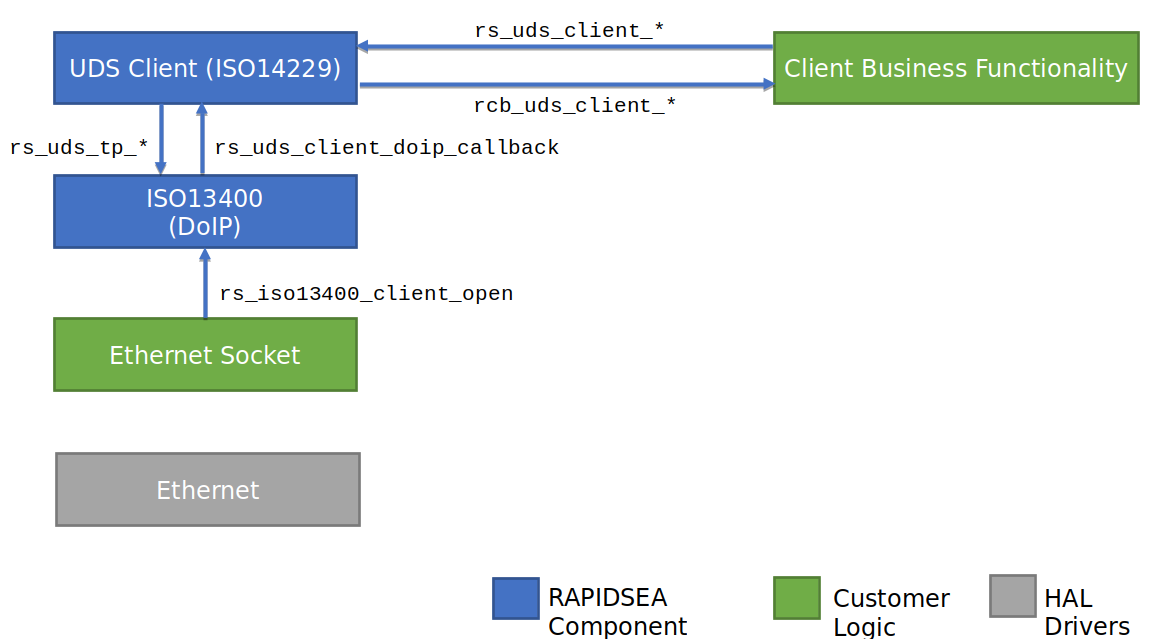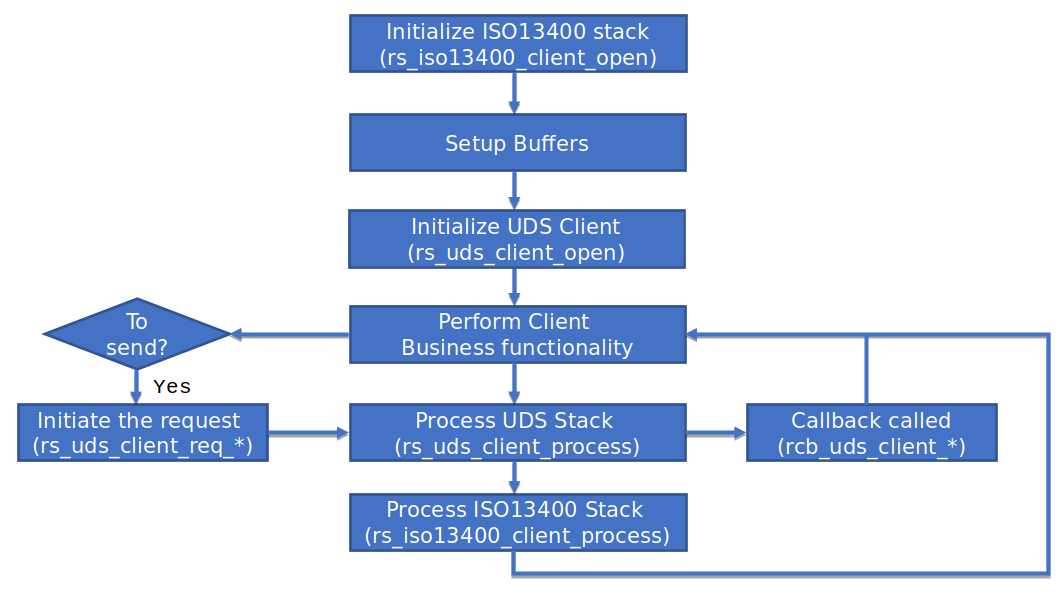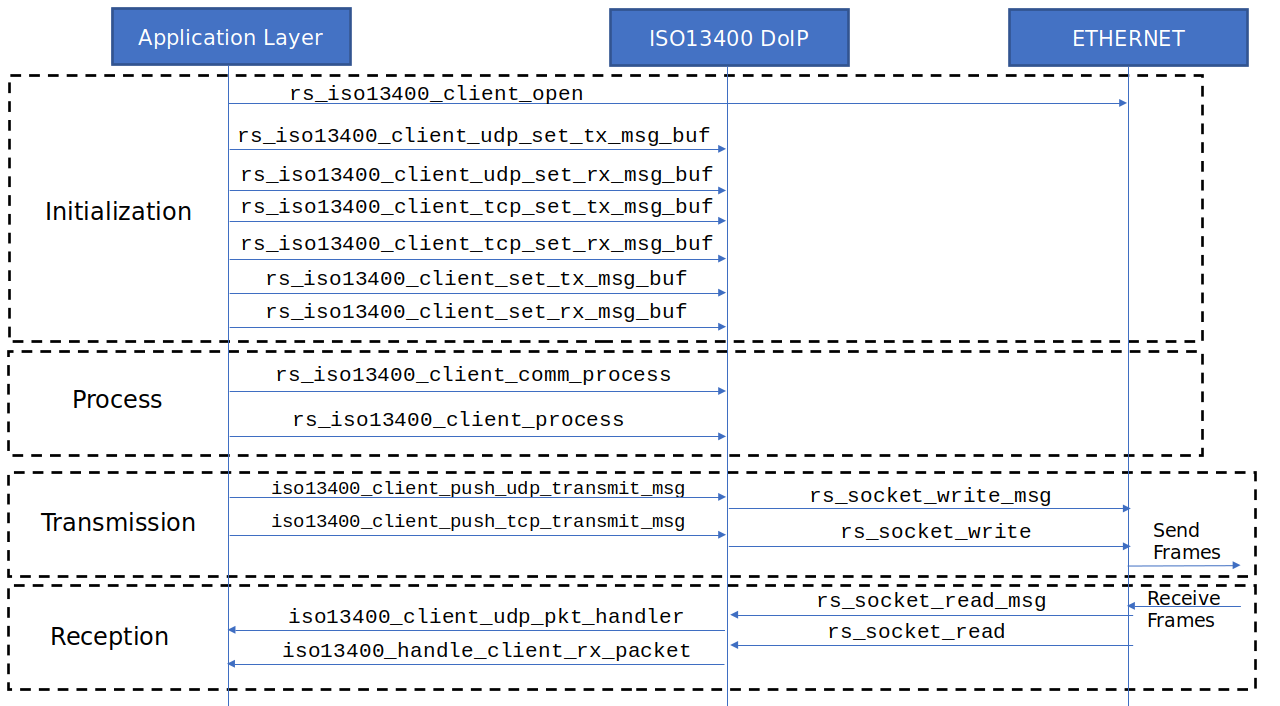DoIP (ISO13400) Client Stack
DoIP Client Overview
RAPIDSEA supports DoIP protocol as explained in the ISO13400 - DoIP Protocol page. This page explains the client architecture and details how the user should interface the stack with their custom logic and realize the Tester implementation quickly. It also provides guidelines on adopting the stack for different systems.
The below diagram captures the block level diagram of the DoIP client and how it interfaces with other modules.

Application Interface
While the RAPIDSEA DoIP client stack can handle most of the functionality such as message validation,vehicle identification process, routing activation process, Diagnostic response messages handling etc, the business logic has to implement the application functionality. The RAPIDSEA DoIP client clearly defines API and callback functions that are essential for the user to use/implement.
The below table captures the function that are to be called from the application logic.
Function |
Description |
|---|---|
rs_iso13400_client_open |
To initialize the DoIP client instance structure for both UDP and TCP process. |
rs_iso13400_client_timer_init |
To initialize the DoIP client timer |
rs_iso13400_client_run |
To be called to set the run state for state machine for both UDP and TCP process. |
rs_iso13400_client_udp_set_tx_msg_buf |
To set up the transmit buffers to be used for the DoIP client UDP communication |
rs_iso13400_client_udp_set_rx_msg_buf |
To set up the receive buffers to be used for the DoIP client UDP communication. |
rs_iso13400_client_tcp_set_tx_msg_buf |
To set up the transmit buffers to be used for the DoIP client TCP communication |
rs_iso13400_client_tcp_set_rx_msg_buf |
To set up the receive buffers to be used for the DoIP client TCP communication. |
rs_iso13400_client_set_tx_msg_buf |
To set up the transmit buffers to be used for the DoIP client and UDS communication. |
rs_iso13400_client_set_rx_msg_buf |
To set up the receive buffers to be used for the DoIP client and UDS communication. |
rs_iso13400_client_comm_process |
To be called periodically to process the incoming/outgoing messages of both UDP and TCP process. |
rs_iso13400_client_process |
To be called periodically to get the request from the UDS stack and frame doip layer on top of UDS request and sent to server. |
rs_iso13400_client_close |
To be called to release the DoIP client handle |
These functions are documented in detail in the below sections. It is important for the client to implement these functions correct for proper operation of the system.
Implementation Guide
This section explains how the DoIP client can be implemented using the RAPIDSEA stack. Whether the stack is available in source form or in binary form, the steps to be followed are
Implement the Callback functions mentioned above
Initialize the buffers necessary for the operation
Initialize the DoIP stack function.
Periodically call the communication process and server process functions so that internal timeouts are handled.
High level flow chart is depicted below:

The below diagram captures the high level sequence of operations associated with the DoIP client stack.

This can be implemented in a bare-metal system or over RTOS or over full fledged OS such as Linux etc.
Dependency
This stack depends on the below RAPIDSEA interfaces that can be obtained or custom implemented.
Example demo
An example implementation is available along with the release and is described in DoIP UDS Client Demo.
DoIP Client Header
Documentation from the relevant header as follows:
Warning
doxygenfile: Cannot find file “rs_iso13400_client.h